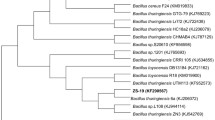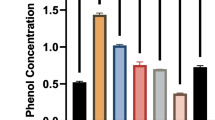Abstract
Microbial degradation of aromatic pollutants has been a promising method for bioremediation and restoring environmental damage. Protocatechuate (PCA) is a common intermediate in the microbial degradation of several aromatic compounds. The present study reports the identification of protocatechuate 3,4-dioxygenase (3,4-PCD)—a key enzyme of the β-ketoadipate pathway, in Bacillus subtilis isolated from coastal water containing waste discharge from paper mills, textile industries, and timber processing factories. The strain efficiently degraded PCA up to 20 mM concentration. Enzyme assay indicated the production of 3,4-PCD and cleavage of the benzene ring at ortho position and the formation of keto compounds of the beta- ketoadipate pathway. The utilization of PCA by plasmid cured cells indicates PCA metabolism is encoded by chromosomal genes. The metabolic potential of the B. subtilis isolate makes it a promising tool for bioremediation of aromatic pollutants present in marine environments.









Similar content being viewed by others
References
Abdelaziz OY, Brink DP, Prothmann J et al (2016) Biological valorization of low molecular weight lignin. Biotechnol Adv 34:1318–1346
Arunachalam M, Mohanraj M, Mohan N, Mahadevan A (2003) Biodegradation of catechin. Proc Indian Nat Sci Acad B69(4):353–370
Ayeronfe F, Kassim A, Ishak N et al (2018) A review on microbial degradation of lignin. Adv Sci Lett 24:4407–4413. https://doi.org/10.1166/asl.2018.11615
Azman NF, Megat Mohd Noor MJ, MD Akhir FN et al (2019) Depolymerization of lignocellulose of oil palm empty fruit bunch by thermophilic microorganisms from tropical climate. Bioresour Technol. https://doi.org/10.1016/j.biortech.2019.01.122
Bernal-Mercado AT, Vazquez-Armenta FJ, Tapia-Rodriguez MR et al (2018) Comparison of single and combined use of catechin, protocatechuic, and vanillic acids as antioxidant and antibacterial agents against uropathogenic Escherichia coli at planktonic and biofilm levels. Mol (Basel Switz) 23(11):2813. https://doi.org/10.3390/molecules23112813
Bjerketorp J, Röling W, Feng XM, Garcia AH, Heipieper HJ, Håkansson S (2018) Formulation and stabilization of an Arthrobacter strain with good storage stability and 4- chlorophenol-degradation activity for bioremediation. App Microbiol Biotechnol 102(4):2031–2040. https://doi.org/10.1007/s00253-017-8706-6
Brink DP, Ravi K, Lidén G, Gorwa-Grauslund MF (2019) Mapping the diversity of microbial lignin catabolism: experiences from the eLignin database. Appl Microbiol Biotechnol 103:3979–4002
Buffing MF, Link H, Christodoulou D, Sauer U (2018) Capacity for instantaneous catabolism of preferred and non-preferred carbon sources in Escherichia coli and Bacillus subtilis. Sci Rep 8(1):11760. https://doi.org/10.1038/s41598-018-30266-3
Chandra R, Abhishek A, Sankhwar M (2011) Bacterial decolorization and detoxification of black liquor from rayon grade pulp manufacturing paper industry and detection of their metabolic products. Bioresour Technol 102:6429–6436. https://doi.org/10.1016/J.BIORTECH.2011.03.048
Chio C, Sain M, Qin W (2019) Lignin utilization: a review of lignin depolymerization from various aspects. Renew Sustain Energy Rev 107:232–249. https://doi.org/10.1016/j.rser.2019.03.008
Choudhary A, Modak A, Apte SK, Phale PS (2017) Transcriptional modulation of transport- and metabolism-associated gene clusters leading to utilization of benzoate in preference to glucose in Pseudomonas putida CSV86. Appl Env Microbiol 83(19):e01280-17. https://doi.org/10.1128/AEM.01280-17
Das R, Hamid SBA, Annuar MSM (2016) Highly efficient and stable novel nanobiohybrid catalyst to avert 3, 4-dihydroxybenzoic acid pollutant in water. Sci Rep 6:33572. https://doi.org/10.1038/srep33572
De Boer AS, Diderichsen B (1991) On the safety of Bacillus subtilis and B. amyloliquefaciens: a review. Appl Microbiol Biotechnol 36(1):1–4
de Gonzalo G, Colpa DI, Habib MHM, Fraaije MW (2016) Bacterial enzymes involved in lignin degradation. J Biotechnol 236:110–119. https://doi.org/10.1016/j.jbiotec.2016.08.011
DeAngelis KM, Sharma D, Varney R, Simmons B, Isern NG et al (2013) Evidence supporting dissimilatory and assimilatory lignin degradation in Enterobacter lignolyticus SCF1. Front Microbiol 4:280. https://doi.org/10.3389/fmicb.2013.00280
Fang X, Li Q, Lin Y et al (2018) Screening of a microbial consortium for selective degradation of lignin from tree trimmings. Bioresour Technol 254:247–255. https://doi.org/10.1016/j.biortech.2018.01.058
Fisher AB, Fong SS (2014) Lignin biodegradation and industrial implications. AIMS Bioeng 1:92–112. https://doi.org/10.3934/bioeng.2014.2.92
Garrido-Sanz D, Manzano J, Martín M, Redondo-Nieto M, Rivilla R (2018) Metagenomic analysis of a biphenyl-degrading soil bacterial consortium reveals the metabolic roles of specific populations. Front Microbiol 9:232. https://doi.org/10.3389/fmicb.2018.00232
Guevara G, Lopez MC, Alonso S, Perera J, Navarro-Llorens JM (2019) New insights into the genome of Rhodococcus ruber strain Chol-4. BMC Genomics 201920:332. https://doi.org/10.1186/s12864-019-5677-2
Gurujeyalakshmi G, Mahadevan A (1987) Degradation of guaicol glyceryl ether (GGE) by B. subtilis. Appl Microbiol Biotechnol 26:289–293
Guzik U, Hupert-Kocurek K, Sitnik M, Wojcieszyńska D (2014) Protocatechuate 3, 4- dioxygenase: a wide substrate specificity enzyme isolated from Stenotrophomonas maltophilia KB2 as a useful tool in aromatic acid biodegradation. J Mol Microbiol Biotechnol 24(3):150–160
Harwood CS, Nicholas NN, Kim MK, Ditty JL, Parales RE (1994) Identification of the pcaRKF gene cluster from Pseudomonas putida: involvement in chemotaxis, biodegradation and transport of 4- hydroxybenzoate. J Bacteriol 176:6479–6488
Henson WR, Campbell T, DeLorenzo DM et al (2018) Multi-omic elucidation of aromatic catabolism in adaptively evolved Rhodococcus opacus. Metab Eng 49:69–83. https://doi.org/10.1016/j.ymben.2018.06.009
Hirose J, Tsuda N, Miyatake M et al (2018) Draft genome sequence of Pseudomonas sp. strain LLC-1 (NBRC 111237), capable of metabolizing lignin-derived low-molecular- weight compounds. Genome Announc 6:e00308-18. https://doi.org/10.1128/genomeA.00308-18
Hogancamp TN, Raushel FM (2018) Functional annotation of LigU as a 1,3-allylic isomerase during the degradation of lignin in the protocatechuate 4,5-cleavage pathway from the soil bacterium Sphingobium sp. SYK-6. Biochemistry 57:2837–2845. https://doi.org/10.1021/acs.biochem.8b00295
Jeżewska-Frąckowiak J, Seroczyńska K, Banaszczyk J, Jedrzejczak G, Żylicz-Stachula A, Skowron PM (2018) The promises and risks of probiotic Bacillus species. Acta Biochim Pol 65(4):509–519. https://doi.org/10.18388/abp.2018_2652
Jutkina J, Heinaru E, Vedler E, Juhanson J, Heinaru A (2011) Occurrence of plasmids in the aromatic degrading bacterioplankton of the baltic sea. Genes 2(4):853–868. https://doi.org/10.3390/genes2040853
Kuang F, Li Y, He L et al (2018) Cometabolism degradation of lignin in sequencing batch biofilm reactors. Env Eng Res 23:294–300. https://doi.org/10.4491/eer.2017.201
Martínez-Valenzuela Marcela et al (2018) Expression of the sRNAs CrcZ and CrcY modulate the strength of carbon catabolite repression under diazotrophic or non-diazotrophic growing conditions in Azotobacter vinelandii. PloS One 13(12):e0208975. https://doi.org/10.1371/journal.pone.0208975
Mei Q, Shen X, Liu H, Han B (2019) Selectively transform lignin into value-added chemicals. Chinese Chem Lett 30:15–24. https://doi.org/10.1016/J.CCLET.2018.04.032
Morales G, Linares JF, Beloso A, Albar JP, Martínez JL, Rojo F (2004) The Pseudomonas putida Crc global regulator controls the expression of genes from several chromosomal catabolic pathways for aromatic compounds. J Bacteriol 186(5):1337–1344. https://doi.org/10.1128/JB.186.5.1337-1344.2004
Ponnusamy VK, Nguyen DD, Dharmaraja J et al (2019) A review on lignin structure, pretreatments, fermentation reactions and biorefinery potential. Bioresour Technol 271:462–472
Ravi K, García-Hidalgo J, Gorwa-Grauslund MF, Lidén G (2017) Conversion of lignin model compounds by Pseudomonas putida KT2440 and isolates from compost. Appl Microbiol and Biotechnol 101(12):5059–5070. https://doi.org/10.1007/s00253-017-8211-y
Sambrook J, Russell DW (2001) Molecular cloning: a laboratory manual, 3rd edn. Cold Spring Harbor Laboratory Press, Cold Spring Harbor
Shanmugam S, Sun C, Chen Z, Wu YR (2019) Enhanced bioconversion of hemicellulosic biomass by microbial consortium for biobutanol production with bioaugmentation strategy. Bioresour Technol 279:149–155. https://doi.org/10.1016/j.biortech.2019.01.121
Stanier RY, Ingraham JL (1954) Protocatechuic acid oxidase. J Biol Chem 210:799–808
Sun Z, Fridrich B, de Santi A, Elangovan S, Barta K (2018) Bright side of lignin depolymerization: toward new platform chemicals. Chem Rev 118(2):614–678. https://doi.org/10.1021/acs.chemrev.7b00588
Suvorova IA, Gelfand MS (2019) Comparative genomic analysis of the regulation of aromatic metabolism in betaproteobacteria. Front Microbiol 10:642. https://doi.org/10.3389/fmicb.2019.00642
Tian M, Du D, Zhou W, Zeng X, Cheng G (2017) Phenol degradation and genotypic analysis of dioxygenase genes in bacteria isolated from sediments. Braz J Microbiol 48(2):305–313. https://doi.org/10.1016/j.bjm.2016.12.002(publication of the Brazilian Society for Microbiology)
Vieira G, Magrini MJ, Bonugli-Santos RC, Rodrigues M, Sette LD (2018) Polycyclic aromatic hydrocarbons degradation by marine-derived basidiomycetes: optimization of the degradation process. Braz J Microbiol 49(4):749–756. https://doi.org/10.1016/j.bjm.2018.04.007(publication of the Brazilian Society for Microbiology)
Wang Y, Li J, Liu A (2017) Oxygen activation by mononuclear nonheme iron dioxygenases involved in the degradation of aromatics. J Biol Inorg Chem JBIC 22(2–3):395–405. https://doi.org/10.1007/s00775-017-1436-5
Wang X, Xia K, Yang X, Tang C (2019) Growth strategy of microbes on mixed carbon sources. Nat Comm 10(1):1279. https://doi.org/10.1038/s41467-019-09261-3
Woo HL, Hazen TC (2018) Enrichment of bacteria from eastern mediterranean sea involved in lignin degradation via the Phenylacetyl-CoA pathway. Front Microbiol 9:922. https://doi.org/10.3389/fmicb.2018.00922
Wu W, Dutta T, Varman AM, Eudes A, Manalansan B, Loqué D, Singh S (2017) Lignin valorization: two hybrid biochemical routes for the conversion of polymeric lignin into value-added chemicals. Sci Rep 7(1):8420. https://doi.org/10.1038/s41598-017-07895-1
Xin Y, Mu Y, Kong J, Guo T (2019) Targeted and repetitive chromosomal integration enables high-level heterologous gene expression in Lactobacillus casei. Appl Environ Microbiol 85(9):e00033-19. https://doi.org/10.1128/AEM.00033-19
Xu R, Zhang K, Liu P et al (2018) Lignin depolymerization and utilization by bacteria. Bioresour Technol 269:557–566
Xu Z, Lei P, Zhai R, Wen Z, Jin M (2019) Recent advances in lignin valorization with bacterial cultures: microorganisms, metabolic pathways, and bio-products. Biotechnol for biofuels. 12:32. https://doi.org/10.1186/s13068-019-1376-0
Yan S, Wu G (2017) Reorganization of gene network for degradation of polycyclic aromatic hydrocarbons (PAHs) in Pseudomonas aeruginosa PAO1 under several conditions. J Appl Gen 58(4):545–563. https://doi.org/10.1007/s13353-017-0402-9
Zhang LS, Fang Y, Zhou Y, Ye BC (2017) Improvement of the stabilization and activity of protocatechuate 3,4-dioxygenase isolated from Rhizobium sp. LMB-1 and immobilized on Fe3O4 nanoparticles. Appl Biochem Biotechnol 183(3):1035–1048. https://doi.org/10.1007/s12010-017-2481-9
Zhang R, Li C, Wang J, Yan Y (2019) Microbial ligninolysis: toward a bottom-up approach for lignin upgrading. Biochem 58:1501–1510. https://doi.org/10.1021/acs.biochem.8b00920
Zhu D, Zhang P, Xie C, Zhang W, Sun J, Qian W, Yang B (2017) Biodegradation of alkaline lignin by Bacillus ligniniphilus L1. Biotechnol for Biofuels 10:44. https://doi.org/10.1186/s13068-017-0735-y
Zhu D, Si H, Zhang P, Geng A, Zhang W et al (2018) Genomics and biochemistry investigation on the metabolic pathway of milled wood and alkali lignin-derived aromatic metabolites of Comamonas serinivorans SP-35. Biotechnol Biofuels 11:338. https://doi.org/10.1186/s13068-018-1341-3
Zhuang L, Tang Z, Ma J, Yu Z, Wang Y, Tang J (2019) Enhanced anaerobic biodegradation of benzoate under sulfate-reducing conditions with conductive iron-oxides in sediment of pearl river estuary. Front Microbiol 10:374. https://doi.org/10.3389/fmicb.2019.00374
Żur J, Piński A, Marchlewicz A, Hupert-Kocurek K, Wojcieszyńska D, Guzik U (2018) Organic micropollutants paracetamol and ibuprofen-toxicity, biodegradation, and genetic background of their utilization by bacteria. Env Sci Poll Res Int 25(22):21498–21524. https://doi.org/10.1007/s11356-018-2517-x
Acknowledgements
The bacterial culture and resources provided by Prof. A. Mahadevan, Center for Advanced Studies in Botany, University of Madras, Chennai, India to conduct this study is thankfully acknowledged. The authors thank Amanda Newsum, Editor, Grand Canyon Education, Phoenix, Arizona, USA, for helping with the editing needs of this manuscript.
Author information
Authors and Affiliations
Corresponding author
Additional information
Publisher's Note
Springer Nature remains neutral with regard to jurisdictional claims in published maps and institutional affiliations.
Rights and permissions
About this article
Cite this article
Velupillaimani, D., Muthaiyan, A. Potential of Bacillus subtilis from marine environment to degrade aromatic hydrocarbons. Environmental Sustainability 2, 381–389 (2019). https://doi.org/10.1007/s42398-019-00080-2
Received:
Revised:
Accepted:
Published:
Issue Date:
DOI: https://doi.org/10.1007/s42398-019-00080-2




